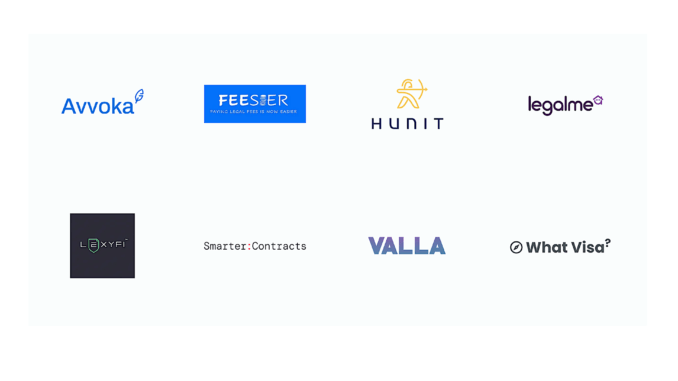
LawtechUK, the taxpayer-funded initiative within Tech Nation, has announced the eight companies that will join the latest cohort of its ‘R&D environment’, AKA the Lawtech Sandbox, which is a kind of incubator covering both commercial law and the consumer market.
The companies are:
Avvoka is a document automation, negotiation and analytics tool designed to help law firms, in-house legal teams and businesses of all sizes draft documents, negotiate them, and leverage data insights to draft better documents, and get to ‘yes’ faster.
Feesier makes buying legal services easier for everyone. Businesses and individuals can split the cost of legal services into instalments at no extra cost. The legal services provider receives their fees upfront to secure payment and protect their cash flow. With Feesier, legal services become more attainable and paying for them more manageable.
Hunit allows any law office, financial group or enterprise to write natively digital legal agreements. Their platform transforms today’s analogue investment agreements into legally binding smart contracts by enabling lawyers to embed self-executing actions directly within MS Word documents.
LegalMe is an online platform that helps tenants facing housing disrepair pursue their own legal claims without the need for a lawyer. Using document automation and case management technology, LegalMe generates legal filings, manages correspondence, and walks tenants through every step of the complex claims journey.
The use of electronic communication by employees exposes companies to a series of risks that can result in litigation, cause significant reputational damage and financial loss, and damage employee morale. Lexyfi leverages the power of artificial intelligence to prevent these risks in real time, provide ongoing training, and increase trust and productivity within organisations.
Smarter:Contracts’ data privacy and consent management platform Pulse, enables businesses to manage their customer consents around data with greater transparency, security and control. Utilising blockchain and machine learning, Pulse allows people and businesses to manage their data in the same way they manage their money.
Valla is on a mission to make legal support accessible and affordable for everyone, starting with unfair treatment at work. Valla’s DIY law platform helps people resolve employment issues themselves without spending thousands in legal fees. Using Valla, people can collect evidence, generate forms and send legal letters. When they need legal advice, they can connect with a lawyer through the Valla platform at an affordable fixed price.
WhatVisa
What Visa? seeks to combat the complexities of the UK’s immigration system. Their self service visa evaluation enables businesses and individuals to see at a glance whether a potential employee is eligible for a work visa, without needing an expert/lawyer. The tool provides assessment, guidance on processes, and workflow tools to help employers that sponsor visas.
—
So, all well and good. But, what does the sandbox do? First, it’s not really a sandbox in the traditional use of the term, which usually refers to allowing a small group of companies to do things that regulators would not normally allow in their sector, and then using the controlled and ring-fenced environment as a way of testing if what the companies do works OK. Most of these companies are already operating.
This is more of an incubator, and one paid for by you and me: the British taxpayers. This is how LawtechUK describes what is has on offer: ‘The Lawtech Sandbox has been designed to help pioneering companies fast track transformative ideas, products and services that address the legal needs of business and society.
‘It provides access to a number of tools and services, to accelerate the development of game-changing [legal tech], including access to legal datasets that are often difficult to source, and a fast-response forum of twelve cross-sector regulators to help work through regulatory challenges.’
As explored before, for this site one of the main benefits here is the chance to get access to legal data, although for those in the consumer and SME sector, supported access to regulators could be very handy.
Also, being part of a government-backed incubator may help in the future with getting VC funding as it gives the companies some additional credibility.
Jenifer Swallow, LawtechUK Director at Tech Nation, added: ‘[Legal tech] is the way we evolve legal services to meet the changing needs of business and wider society – there is a £22bn unmet demand for [legal tech] in the UK alone. Despite triple digit growth in the UK [legal tech] sector over the last three years, there are barriers we need to tackle collectively, to unlock the full potential of [legal tech].
‘The Lawtech Sandbox is about bringing people together to address those barriers and help [legal tech] pioneers accelerate through their development cycles faster than they could alone. The goal is for that support ultimately to benefit the whole market and push the boundaries of what is possible.
‘We are delighted to have chosen eight pioneering [legal tech companies] across a range of target segments to take part in the Lawtech Sandbox, and look forward to wrapping around them the tools and community they need to deliver and thrive.
‘Appreciation goes to all the applicants, as well as to our judging panel who had the difficult decision of choosing the cohort. It has been fantastic to see the strong pipeline of [legal tech] innovation across the UK, much of it originating outside of London and with a diverse array of founders.’